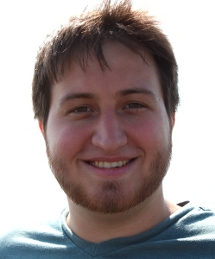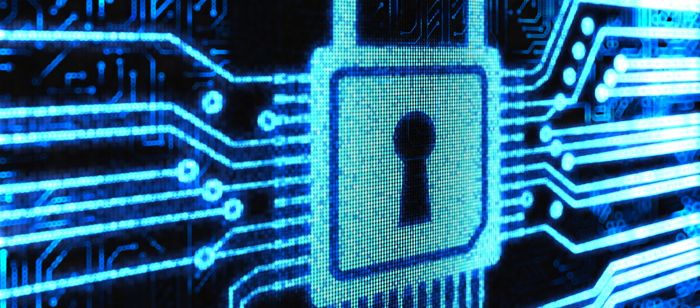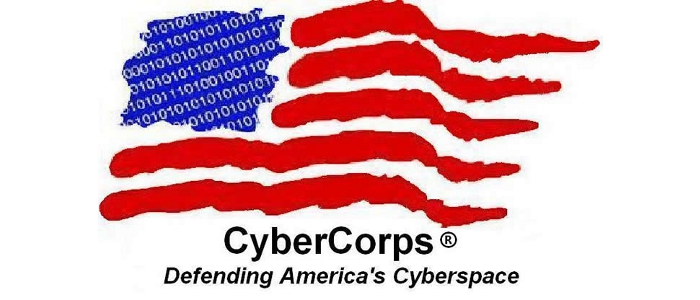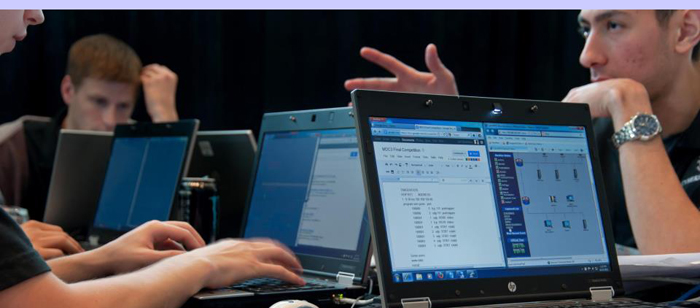Meet UMBC’s inaugural batch of NSF Scholarship for Service (SFS) CyberCorps program scholars. These four B.S., M.P.S. and Ph.D. students will be able to hone their interests in Information Assurance and Cybersecurity through generous full-ride scholarships and opportunities to intern at government organizations.
Oliver Kubik
Major: B.S. Computer Science '14
Hometown: New Windsor, MD

Oliver Kubik knew that Computer Science was for him starting in the 7th grade when he played with madlib style programs on his basement computer. Now a Junior working toward his B.S. in Computer Science at UMBC, Oliver has plans to one day pursue a Ph.D.
What Oliver likes about Information Assurance and Cybersecurity is the problem solving and detective work. “Everything must be analyzed much more in depth than conventional software applications whose bugs typically have minor consequences,” he says. “I think that securing mobile devices will be very important in the future.”
A Meyerhoff Scholar, Oliver is part of UMBC’s Cyber Defense Team and Ultimate Frisbee team. In Summer 2012, he pursued undergraduate research at the University of Connecticut, comparing the strengths of Amazon’s EC2 and Windows’ Azure cloud computing systems. “My results didn’t show a clear superiority of one system over another, but I did learn a lot about academic research, especially in the importance of organizing the data that is collected.”
His Freshman year, Oliver interned at System’s Alliance in Hunt Valley, creating an automated testing framework for their web portal to speed up the logging of bugs. Here he learned about the complexities of web pages and the Selenium web automation tool. That summer he did similar work as an intern at Booz Allen Hamilton.
As part of the SFS program, Oliver hops to intern at the National Security Agency. His plans after graduating in May 2014 are to explore work in the governmental sphere before pursuing a Ph.D. in Cybersecurity.
Brandyn Schult
Major: B.A. Human Ecology, M.P.S. Cybersecurity ‘14
Lured by UMBC’s distinction as a CAE school and its prime location in the “Silicon Valley of Cyber”, Brandyn Schult joined UMBC’s Cybersecurity M.P.S. program in Fall 2012 to broaden his understanding of Cybersecurity. He is now part of UMBC’s Cyber Defense Lab (CDL).
“What I like about Information Assurance and Cybersecurity is that they are not bound by many technical limitations and new practices are constantly being developed,” explains Brandyn, who graduated from the College of the Atlantic, Maine with a B.A. in Human Ecology. “What we have as students is a chance to help shape a new discipline and that is exciting.”
Brandyn speculates that the biggest cyber threat we face today isn’t from outside sources, like viruses or hackers, but from “the legacy infrastructure that the cyber domain is built on and the users’ interaction with it.” He cites IPv4 and SCADA systems at a fundamental problem. “It’s 2012, yet we are still using technology from the 70’s and 80’s as the foundation for the technology today and tomorrow.”
Brendan Masiar
 Major: B.A. Philosophy '11, M.P.S. Cybersecurity '13
Major: B.A. Philosophy '11, M.P.S. Cybersecurity '13
Hometown: East Islip, NY
After graduating from UMBC a year ago with a Bachelor’s in Philosophy, Brendan Masiar came right back to pursue his passion for Computer Science. He chose UMBC’s graduate program in Cybersecurity because he saw it as “a perfect blend of [his] humanities and technical background.”
“I love that the field is constantly developing and evolving,” says Brendan of Cybersecurity. “There is no definitive end point to cybersecurity, ” he says, “some new attack vector will always be out there.” Brendan thinks cell phones and mobile devices that enable us to do things like online baking, check mail, and other private tasks, are our biggest cyber threat. “The risk for data loss and identity fraud is going to be more and more rampant.”
Right now Brendan is interning at Tresys Technology in Columbia, where he works on testing and developing software. After finishing up school, he will be looking for a job within Maryland’s IT industry. “My dream job is one that will be setting precedents, whether it be through policy or through methods used,” he explains. His role model is Dr. Steven Yalowitz of UMBC’s Philosophy Department, who got Brendan hooked on the subject. “I hope one day to instill that same curiosity into others.”
Lisa Mathews
Major: M.S. Computer Engineering, Ph.D. Computer Science '15
What is it about Cybersecurity and Information Assurance that appeals to Ph.D. student Lisa Matthews? “They are challenging fields that provide many opportunities to apply one’s knowledge and skill set to tackle various security issues or vulnerabilities,” explains Lisa. “Protecting computers and information from various threats is an important function, especially given the number of security attacks that have happened and are likely to occur.”
Lisa thinks that a new wave of “low-and-slow” attacks—ones that surreptitiously strike in different phases and can spend days, weeks, or even months weakening a system’s defenses–are a big threat. “These are difficult to detect, hard to contain, and can do considerable damage before they are stopped.” In fact, Lisa is working towards a solution to these types of attacks with her thesis research. “My current research is focused on taking a semantic approach to intrusion detection by combining data from various sources, integrating data, and performing additional analysis using a knowledge base that would enable the detection of a threat or attack. This method should prove to be useful in stopping attacks that follow a low-and-sow intrusion pattern.”
After graduating, Lisa hopes to work for one of the Department of Defense agencies. “My dream job is one where I can continue research on the constantly evolving fields of information assurance and cybersecurity,” she says. “This scholarship is providing me a great opportunity to attain this job.”










